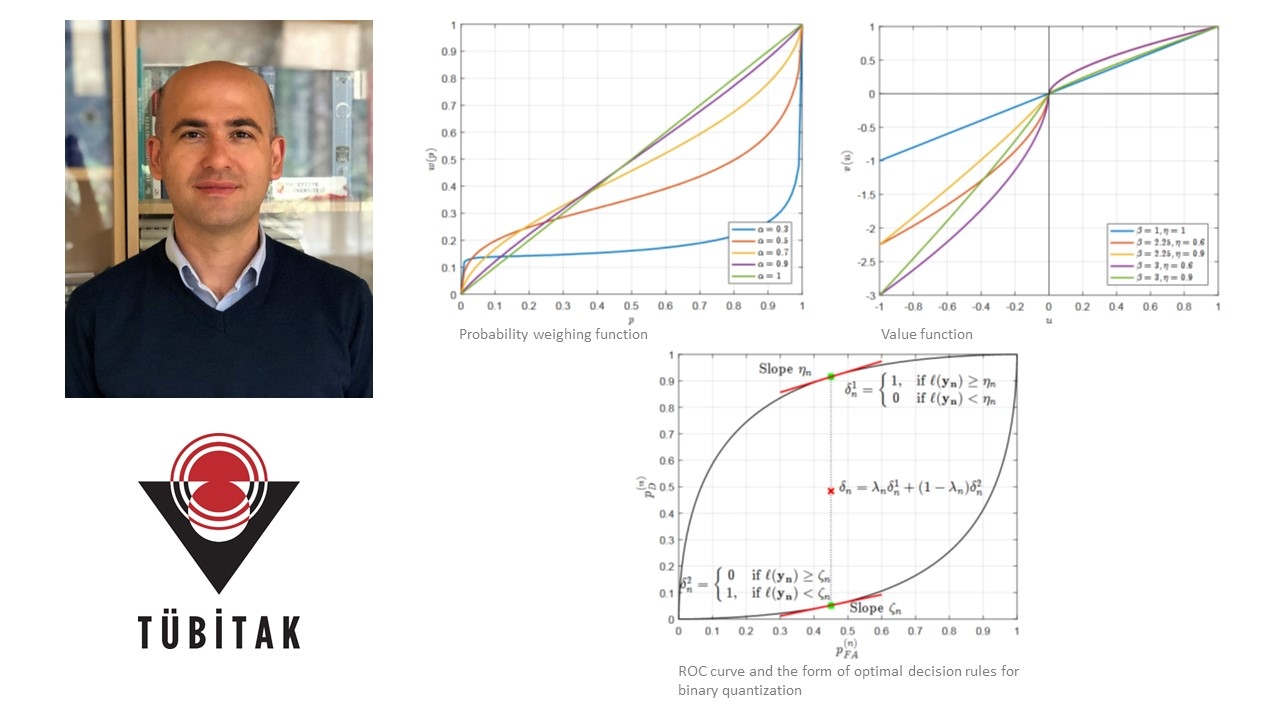Announcements
TUBITAK 1001 Project: Optimal Decision Rules for Prospect Theory-based Performance Criteria in Distributed Detection Systems
February 16, 2023
Our faculty member Dr. Berkan Dülek's research project "Optimal Decision Rules for Prospect Theory-based Performance Criteria in Distributed Detection Systems" kicked off on February 15, 2023 within 1001 Funding Program of The Scientific and Technological Research Council of Türkiye.

The purpose of this program is to support research projects that comply with scientific principles for generating new information, making scientific comments or solving technological problems.
A summary of the project is below.
We extend our congratulations to Dr. Dülek and his team for this prestigious project.
Project Summary
The problem of selecting one among a finite number of hypotheses that explain the state of a phenomenon of interest based on measurements taken under uncertainty and with respect to a specific performance criterion is the subject of detection theory. In distributed detection systems, the measurements made by different sensors are quantized and then sent to a fusion center. Based on the quantized outputs or the local decisions of the sensors, a final decision regarding the state of the phenomenon of interest is declared in the fusion center. Generally, the decision rules employed at the sensors and that at the fusion center are designed to optimize objective performance metrics like Bayes risk, average probability of error, or Neyman-Pearson criterion. However, as it is evident from many applications that involve distributed decision tasks such as crowdsourcing and recommendation systems which rely upon people's choices and ratings, the decisions may need to be taken based on human agents' subjective opinions shaped by behavioral, psychological, and social-economic perceptions. Prospect theory was developed in the field of economy to accurately predict humans' decisions in risky situations involving losses and gains. At the heart of prospect theory lies the idea that humans perceive losses and gains by passing them through a value function, and likewise, they perceive probabilities by passing them through a weighting function, which is called the framing effect in the relevant literature.
In this project, behavioral (boundedly rational) versions of the objective performance criteria commonly employed in the distributed detection literature are proposed based on mathematical models used in prospect theory. Our aim is to determine the optimal local and fusion center decision rules for distributed detection systems that include human agents. In this way, it will be possible to determine the optimal decision rules under more realistic models for situations where the utility of a final decision is assessed by humans or when fusion of heterogeneous data collected from both physical sensors and human agents needs to be performed or in human-centric distributed detection applications like crowdsourcing.
To apply for available positions, send your e-mail to berkan@ee.hacettepe.edu.tr
A summary of the project is below.
We extend our congratulations to Dr. Dülek and his team for this prestigious project.
Project Summary
The problem of selecting one among a finite number of hypotheses that explain the state of a phenomenon of interest based on measurements taken under uncertainty and with respect to a specific performance criterion is the subject of detection theory. In distributed detection systems, the measurements made by different sensors are quantized and then sent to a fusion center. Based on the quantized outputs or the local decisions of the sensors, a final decision regarding the state of the phenomenon of interest is declared in the fusion center. Generally, the decision rules employed at the sensors and that at the fusion center are designed to optimize objective performance metrics like Bayes risk, average probability of error, or Neyman-Pearson criterion. However, as it is evident from many applications that involve distributed decision tasks such as crowdsourcing and recommendation systems which rely upon people's choices and ratings, the decisions may need to be taken based on human agents' subjective opinions shaped by behavioral, psychological, and social-economic perceptions. Prospect theory was developed in the field of economy to accurately predict humans' decisions in risky situations involving losses and gains. At the heart of prospect theory lies the idea that humans perceive losses and gains by passing them through a value function, and likewise, they perceive probabilities by passing them through a weighting function, which is called the framing effect in the relevant literature.
In this project, behavioral (boundedly rational) versions of the objective performance criteria commonly employed in the distributed detection literature are proposed based on mathematical models used in prospect theory. Our aim is to determine the optimal local and fusion center decision rules for distributed detection systems that include human agents. In this way, it will be possible to determine the optimal decision rules under more realistic models for situations where the utility of a final decision is assessed by humans or when fusion of heterogeneous data collected from both physical sensors and human agents needs to be performed or in human-centric distributed detection applications like crowdsourcing.
To apply for available positions, send your e-mail to berkan@ee.hacettepe.edu.tr
More announcements

